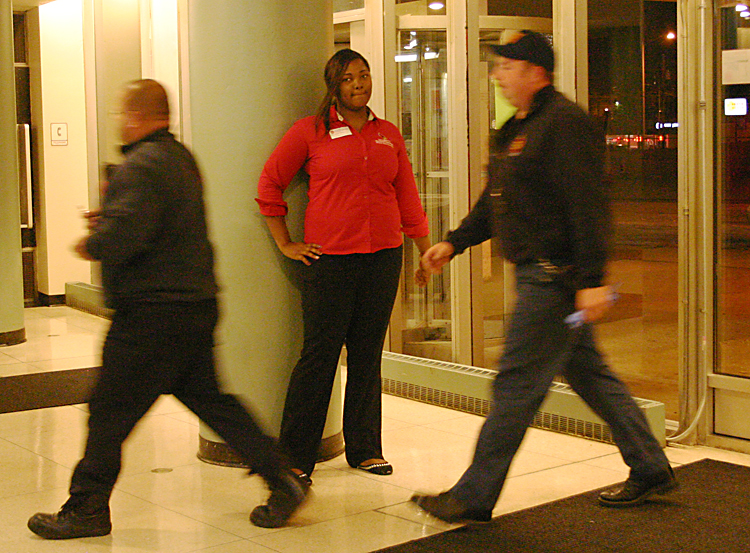- Ambrea Powe,
Sophomore medical laboratory science major
 |
Night Operations worker Lauren Mathis steps out of the way as EMTs from BroMenn Medical Center respond to an emergency call Friday night at Whitten Hall. (Photo by Kristen Wegrzyn / Staff Photographer) |
NORMAL—As the clock strikes midnight, the revolving doors immediately screech to a standstill, the door alarms are set and the oh-so familiar line of “Can I see your IDs and keys please?” echoes continuously throughout the night. Night managers Ambrea Powe, seated behind the desk ready to take care of residents’ paperwork, and Lauren Mathis, stationed right by the door to escort people to the desk and check IDs and keys, have seen and heard it all in the two years they’ve worked Night Operations [Night Ops].
The Night Operations program at ISU was implemented in 1990 under University Housing Services. The program has been able to settle proration costs assessed to residents, provide an additional measure of security and provide employment to students.
Compared to normal 9 a.m. to 5 p.m. working hours, Night Ops is quite difficult for some students to handle. With shifts starting from 11:30 p.m. to 6:15 a.m. some students may find that their sleep is more valuable than dealing with residents in the wee hours of the morning.
“I usually make sure I get enough sleep before I have to work. It’s essential because you’re going to be working six hours with only a 30 minute break but that’s about it,” Ambrea Powe, sophomore medical laboratory science major and night manager, said.
According to sophomore mass communication major and new night manager Sallie Young, Night Ops is definitely a time adjustment. “My whole schedule shifted when I got this job. My sleeping patterns changed and I had to find time to put a nap in my day so I wouldn’t feel exhausted.”
While most people are getting settled in bed and watching the latest episode of the Jersey Shore, Powe and Mathis are preparing for the long night of checking guests into the residence halls, answering the usual questions of “do I need my ID and key to get back in?’ or “do I have to check in if I’m just getting Subway?” and making sure that the residence halls are safe at all times.
“A majority of the time we get questions that are common sense and sometimes even when we tell them to keep their keys and IDs with them at all times somehow something always happens that makes them not have it,” Lauren Mathis, senior special education major and night manager, said.
During Limited Access Hours, residents and their guest(s) are allowed to enter through the main entrance of the residence halls. This enables the Night Operations staff to monitor the flow of pedestrian traffic during those hours. The Night Operations purpose is to ensure the safety of residents through a safe environment.
Before Limited Access Hours night managers must make sure every door is locked in the building and must document if one is not. According to Robert Harris, Assistant Coordinator for Night Operations, this is a necessary procedure that is not taken lightly.
“We make sure that everything that should be locked is locked because we want to ensure that the building is safe for everyone in it. We do it for students’ safety as well as our own. We write everything that happens in the building in the workers duty report so that if something should go wrong we can know exactly what was going on,” Harris said.
Though safety is their number one priority, Powe and Mathis still find ways to make the time fly when the residence halls experience a drought of traffic coming in. “I’ve had my best conversations about random things during work. We talk about thinks from school to relationships to goals in life. It gives up time to speak to people that you normally wouldn’t talk to as well,” Powe said.
As 6 a.m. hits the horizon with the sound of birds chirping, coffee brewing and the sun rising, limited access hours are officially over. Powe and Mathis leave with one night successfully done but realize that they must do the same thing later that night.